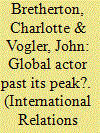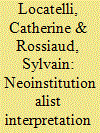|
|
|
Sort Order |
|
|
|
Items / Page
|
|
|
|
|
|
|
| Srl | Item |
| 1 |
ID:
127069


|
|
|
|
|
| Publication |
2013.
|
| Summary/Abstract |
Examining a range of policy areas in which the European Union (EU) acts externally - notably trade, development, climate change and foreign and security policy - this article considers the notion that the years since the mid-2000s have witnessed a decline in EU actorness/effectiveness. In evaluating EU performance, the article employs the interrelated concepts of presence, denoting EU status and influence; opportunity, denoting the external context of EU action; and capability, referring to EU policy processes and instruments, with particular reference to the impact of the 2009 Lisbon Treaty. It is contended that achievement of the increased capability envisaged by the Lisbon Treaty, together with resolution of the Eurozone crisis, with its deleterious effect upon the Union's presence, would not fully compensate for the loss of opportunity provided by the changing international structure.
|
|
|
|
|
|
|
|
|
|
|
|
|
|
|
|
| 2 |
ID:
138869


|
|
|
|
|
| Summary/Abstract |
The growth of European Union (EU) competences in the field of external security in the last decade has produced a substantial increase in the number of EU institutions and bureaucratic actors engaged in the planning and management of these policies. Moreover, the expansion of competences in such a sovereign sensitive area comes up against the persistent tergovernmental nature of the security sector. This has resulted, on the one hand, in a complex institutional architecture with heavy demands in terms of coordination, and on the other hand, in a stark differentiation and stratification of the legal regimes with a potential to impact on policy outcomes. This state of uncertainty is particularly relevant when looking at relations with countries bordering the Union, as the long-standing web of interactions there has developed a more complex institutional environment. While most of the scholarly literature focuses on single institutional sectors or policies (Common Security and Defence Policy, European Neighbourhood Policy, or the external side of the Area of Freedom, Security and Justice), this study seeks to address the issue with a comprehensive analysis of the institutional framework that has emerged in the last decade, more notably, since the entry into force of the Treaty of Lisbon. The article provides, first, an overview of the EU’s institutional actors responsible for security policies in the regions bordering the EU, and second, an examination of the different mechanisms established to address the coordination issue. Finally, this study will argue that the traditional military dimension is but one, and certainly not the most developed, of the security instruments employed by the EU. At another level, it will be argued that the shift of focus from the military to other security tools has altered the institutional balance in the security sector, substantially adding to the relative influential weight of the Commission.
|
|
|
|
|
|
|
|
|
|
|
|
|
|
|
|
| 3 |
ID:
109447


|
|
|
|
|
| Publication |
2011.
|
| Summary/Abstract |
This paper deals with the current change of the institutional and organizational framework of the Russian oil industry. Regarding this evolution, the main characteristic is the increasing involvement of national oil companies in the upstream activities. The point is to explain this reorganization by relying on the New Institutional Economics framework. These theoretical works highlight that institutional environment and governance structures complement each other. We argue that the current reorganization in an attempt to increase the coherence of the institutional arrangement governing the transaction between the Russian state and the private oil companies.
|
|
|
|
|
|
|
|
|
|
|
|
|
|
|
|
|
|
|
|
|